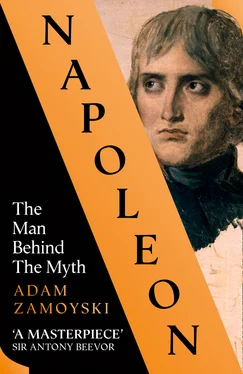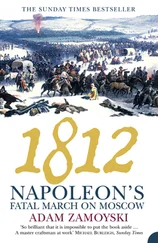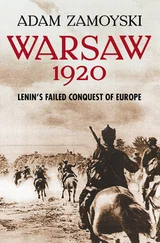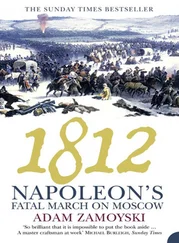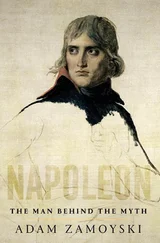Bonaparte immediately assumed a tone which brooked no argument. ‘I have taken command of the Army of Italy,’ he wrote to Masséna less than forty-eight hours after his arrival. ‘Nominating me, the executive Directory hopes that I may be of use in leading it towards the brilliant destiny which awaits it. Europe contemplates it with awe, and France expects from it all the triumphs of a campaign.’ At the same time he flattered the commanders, officers and men, raising their hopes of action, glory and rewards, while Junot and Marmont spread their own admiration and love of the new commander. With a dose of wishful thinking, four days after his arrival he assured Josephine that ‘my soldiers display a confidence in me impossible to describe’.2
The troops were in poor shape. To have any idea of the conditions, one has to forget all the paintings of finely-uniformed officers leading ranks of men with immaculate white facings and bright-red epaulettes on their well-cut blue coats, with blue, white and red plumes in their hats. Few of the men had boots, and many had no trousers. Some had no uniform jackets. They made themselves footwear out of woven straw and in the absence of hats wore knotted handkerchiefs on their heads. Most of them looked more like scarecrows than soldiers.3
They had scant equipment, and were expected to find themselves shelter for the night as best they could when on operations, as there were no tents. Disease and infections dramatically reduced the number of effectives. The companies contracted to supply them pocketed most of the money they received from the government. Even in cantonment around Nice the troops were poorly fed, with meat once every four days, beans once in three, and bowls of rice flavoured with lard the rest of the time. In the autumn they had been able to supplement their diet by gathering chestnuts, but the winter had robbed them of this resource. They could not buy food as they were paid irregularly, and then only in worthless assignats . Some of the senior officers who received cash contributions from the local administration to pay the men did not pass it on. The men had been stuck in the same place for months with nothing to do, and morale was low. Desertion was rife and acts of insubordination frequent. Disaffection had reignited anti-government and even royalist feeling among the older men, and shouts of ‘ Vive le Roi ’ were not infrequent. One demi-brigade mutinied shortly before Bonaparte’s arrival, one soon after.4
Bonaparte realised extreme measures were needed, and with Saliceti as the Directory’s commissioner, he was in a position to take them. He had a couple of officers court-martialled to set an example. He sent Chauvet to Genoa to raise a loan and purchase supplies, and wrote to the local authorities demanding food and forage, threatening to send the men out to loot and rape if these were not provided. With a mixture of threat and flattery he managed to get the contractors to disgorge victuals and the local administration to make up for some of the arrears in pay. He gave instructions that the men must have fresh or salt meat every day.5
He had selected as his chief of staff a man of experience, his senior in rank and age, whom he had met only recently. The forty-two-year-old Alexandre Berthier had trained as a military engineer and cartographer before receiving his baptism of fire as a captain in the American War of Independence. With his steady temperament, extraordinary memory, unmatched attention to detail, precise mode of expression and legible handwriting, Berthier was the perfect man for the job. He could grasp in a second some hastily-rapped-out order and give it coherent form, while his team ensured it was passed on to the appropriate quarter with a professionalism hitherto unknown in the army of the Republic. Bonaparte supervised and inspected, noting deficiencies and passing them on to Berthier, demanding immediate action. He was so confident that within two days of his arrival he reported to Carnot that ‘I have been very well received by the army, which shows a confidence in me for which I am deeply grateful.’ Quite how much confidence the army felt is questionable.6
François Vigo-Roussillon, a sergeant in the 32nd Demi-Brigade under Masséna, was astonished when his neighbour whispered that the diminutive figure who had just ridden up to their ranks was the new commander-in-chief. ‘His appearance, his dress, his bearing did not appeal to us,’ he recalled; ‘… small, slight, very pale, with great black eyes and hollow cheeks, with long hair falling from his brow to his shoulders in two dog’s ears, as they were then known. He wore a blue uniform coat and over that a nut-brown overcoat. He was mounted on a large bony sorrel horse with a docked tail.’ He was followed by a single servant ‘on a rather sad looking mule’ borrowed from the supply train. The new general introduced himself to the assembled troops with a speech in which he held out the prospect of glory and the possibility of rich plunder if they managed to defeat the enemy and break into Italy. His address produced little effect, and one officer recalled that afterwards the men made fun of his hairstyle and mimicked his accent.7
The troops were an amalgam of former royal soldiers, volunteers and conscripts. Most of the younger men came from the poorer mountainous regions of southern France. They were physically hardened and used to rigorous marches. The make-up of the officer corps was overwhelmingly plebeian (the percentage of nobles had fallen from 80 to 5 between 1789 and 1793), which contributed a sense of fraternity between officers and men, enhanced by the universal penury, as officers and even most of the generals could not afford a horse (the artillery was drawn by mules). The most disciplined units were those which had just been transferred from Spain, where they had fought a victorious campaign.8
The infantry divisions each had between three and five demi-brigades, the basic fighting unit at the time. The heavy demi-brigades were supposed to number 3,000 men and the light ones 1,500. Masséna commanded two divisions, Augereau and Sérurier one each. The cavalry, which numbered less than 5,000 men and was of poor quality and short of horses, was led by General Henri Stengel, a fifty-two-year-old German who had been in French service from the age of sixteen. The overall strength of the French Army of Italy was, on paper, 60,000 men, but most historians agree that the real figure was no more than about 47,000. Some put it as low as 35,000.9
Facing them in the Alpine passes were 18,000 men of the Sardinian army, well-trained, hardy Savoyard mountain men under the command of the Austrian field marshal baron de Colli. Beside them stood 35,000 Austrians under the seventy-one-year-old Field Marshal de Beaulieu, a Belgian by birth. His troops were disciplined, well-trained, steady and motivated, but they were used to set-piece battles and methodical manoeuvres, which would disadvantage them in the tight valleys and boulder-strewn terrain on which they were to fight.
Bonaparte’s orders were to stage a diversion that would tie down the maximum number of Austrian forces in Italy while the two stronger French armies poised on the Rhine defeated the main Austrian army in Germany and marched on Vienna. But he did not think like a soldier content merely to carry out the task he had been set. He believed that as long as the Habsburgs remained dominant in Italy they would present a threat to France, and that the centuries-old rivalry between the two states for hegemony over the peninsula should be resolved. He had studied the various Franco-Austrian wars over Italy, most recently Marshal Maillebois’ campaigns of 1745–46. He had pored over maps of the area during the past two years, becoming familiar with the lie of the land and making mental notes of which passes were practicable by artillery, where rivers could be forded, and which were the possible lines of advance and retreat not only for his own army but for the enemy as well. He meant to wipe out the threat to France by expelling the Austrians from Italy.
Читать дальше
